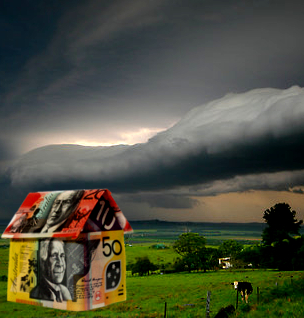Premium doubling ahead as climate changes insurance
 Consumer group Choice says high home insurance premiums are on the horizon, as climate change brings a storm of new damages.
Consumer group Choice says high home insurance premiums are on the horizon, as climate change brings a storm of new damages.
Choice has commissioned a study of the changing environment’s effect on home premiums, warning they could almost double in decades ahead.
Reports say some insurers are rejecting customers deemed too risky already, such as those living in cyclone-prone Far North Queensland.
The chief executive of the research group Climate Risk says the places Australians most like to live are also the most risky.
“Areas prone to bushfire, areas prone to extreme winds” have already become more expensive, researcher Karl Mallon told the ABC.
“Now the insurance companies must price those in, into their premiums but those can be several thousand dollars a year with your premiums up to $7,000 a year for a home and that's not including contents.”
Estimates so far show premiums may rise by close to 92 per cent during the period of a mortgage today.
That would bring down the values of more than 20 per cent of properties, relative to the general market.
“That is inevitable and I guess that's one of the major reasons for this report is what we're trying to do is get some information which frankly, has been known in expert circles for some time,” Mr Mallon added.
The Insurance Council of Australia (ICA), a leading industry lobby, has indicated that many insurers price policies for the year ahead only and do not take account of long-term projections.
“Insurers certainly can't inform consumers about the anticipated risk under whatever scenario that climate change might have on that property,” ICA spokesperson Campbell Fuller told reporters.
“That's not the role of insurance, but what insurers do do with consumers is send a very strong price signal. If you live in an area that is exposed to extreme weather - whether it's flood, cyclone, bushfire - then that is already priced into your premium.”
With so much money at play, insurers are certainly using the longest projections of risks that they can muster, but Mr Fuller said it would create a huge competitive disadvantage if a company gave that information to customers.
Asked about letting customer know what may lie ahead, he retorted: “Are you suggesting that insurers should open their commercially sensitive data to consumers based on any number of scenarios that might take place?”
“I think that's commercial lunacy.”
“I think that Choice is demonstrating a lack of understanding of the insurance market,” he said.








 Print
Print